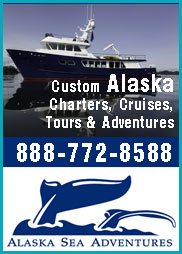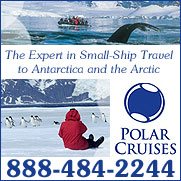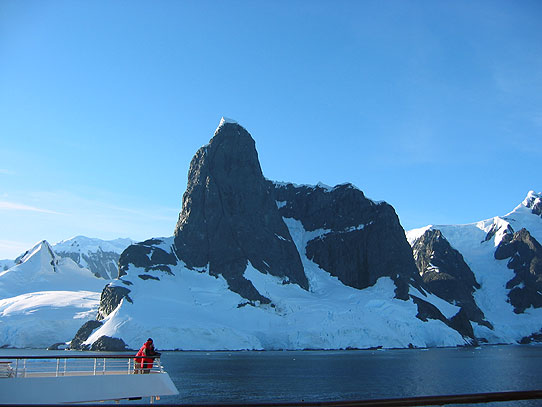|
 nce
upon a time, the joke among those in the cruise industry was that
the cruise nce
upon a time, the joke among those in the cruise industry was that
the cruise
vacation was something for the "newly wed or the nearly dead."
I remember those jokes, as well as a time in my own life when
I would be embarrassed to say that I was even going on a cruise.
One day it occurred to me-how else could I see seven Caribbean
island nations in eight days or explore a series of major Alaskan
cities that are inaccessible by road in under a week? I quickly
became a champion of the cruise experience. (Sure there was also
the pampering, the shows and the endless buffets, but who was
I to complain?) Today the cruise industry has exploded to such
an extent that there are now options available for everyone from
family-friendly and budget cruises to excursions that focus on
ecology, wildlife, and expeditions to places on the planet long
considered inaccessible.
After setting foot aboard the deck of the 650-passenger vessel,
MV Discovery, I began asking guests why they chose to take an
eight-day cruise to Antarctica-the coldest, windiest and driest
continent in the world; a landscape which is 98 percent thick
continental ice sheet and 2 percent barren rock; a continent so
cruel and unforgiving that virtually no life can survive on it.
The overwhelming answer from my fellow cruisers was simple: "Because
now I can." It was a good answer. The more I thought about
it, I realized it was mine too.
Back story
It was not confirmed until the early 1800s
that there was even the existence of a "southern land,"
when British, American, Norwegian and Russian expeditions began
exploring the Antarctic Peninsula region. In 1840 it was established
that Antarctica was a continent-the fifth largest continent in
the world-and not just a group of islands. Whalers and fur seal
hunters braved the rough seas and brutal terrain for treasure.
Following World War II there was an upsurge in scientific research
on the continent, with a number of countries setting up year-round
research stations. Seven made territorial claims, and the Antarctic
Treaty was negotiated in 1961, honoring existing territorial claims
and giving the nations the right to explore the continent for
scientific reasons. The first cruise ship exclusively for the
sake of tourism sailed to Antarctica in the summer of 1950, the
only season in which the weather makes it possible. By 1970, as
the cruise industry began to grow, so did tourism to Antarctica,
and by 2005, 36 different vessels made it to the continent in
one year. For many it is a journey into history; for others an
unparalleled ecological and sea life experience; but for most,
it is the trip of a lifetime.

Top: The Gentoo Penguins don’t seem to
even notice the M/V Discovery
Bottom: Gentoo Penguins feeding chicks.
Photos by Deb Roskamp
The MV Discovery experience
FIRST STOP: BUENOS
AIRES
Your 13-day journey will begin with a flight
to Buenos Aires, Argentina, a world-class city that deserves a
written piece entirely its own. The Discovery package offers a
comprehensive tour of this city of approximately 12 million people
that has a lifestyle and architecture that is more European than
any city in South America. You will see a grand city of somewhat
faded glory, wide boulevards, monuments, parks, distinctive neighborhoods
and stylish looking people. Not to be missed is a tango show -
a dance born in the brothels of Buenos Aires' immigrant quarters
- and a trip to a legendary steakhouse, which features beef from
the pampas. A sampling of empanadas as well as mate', a medicinal
tea, which is the national drink of Argentina, should also be
essential components of your stay. The Discovery package includes
accommodations in a four-star hotel, situated in the heart of
the city.
A 3 ½ hour flight
to Ushuaia
Billed as the southernmost city in the world,
the ski resort town of Ushuaia sits on the bottom tip of Argentina,
where a dramatic mountain landscape falls directly into the sea.
Once the home of a penal colony - which is now a museum and definitely
worth visiting - this is where embarkation begins on the MV Discovery.
The Discovery package, though, wisely allows guests to spend 24
hours in this remote part of the world for tours of the city and
Tierra Del Fuego National Park. There's also plenty of time to sample
local dishes that include Patagonian lamb and king crab.
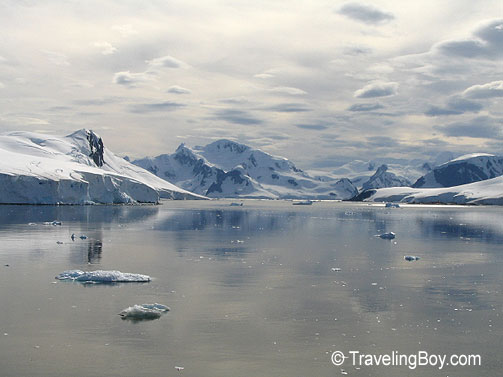
The Stark and lonely beauty of Antarctica.
Photo by Deb Roskamp
The MV Discovery
The MV Discovery is a handsome vessel with
a deep hull, making it possible to negotiate Antarctica's rough
seas and massive icebergs. It also features the usual creature
comforts with 351 spacious cabins and suites, three restaurants,
five lounges, a night club, two swimming pools, hot tubs, library,
theater, internet center, health club and beauty center. I was
pleased to find a complimentary expedition parka waiting for me
in my cabin, something that became an essential part of my wardrobe
to deal with the brisk weather conditions.
Discovery's expedition team
One of the plusses of the voyage is that
a team of working polar explorers conducts
lecture programs on board. The team is easily accessible to answer
questions regarding everything from polar glaciers and other ice
formations to how sea life can survive in such an extreme environment.
The team also educates guests on the sensitive nature of preserving
this pristine continent from human harm.
Crossing the Drake
"Below 40 degrees, there is no law.
Below 50 degrees, there is no God," was
the sailors' creed about crossing the Drake Passage-a merciless
400-milewide
passage between the southern tip of South America and Antarctica.
Named after Sir Francis Drake (who never passed through the route)
it is considered to have some of the worst sea weather in the
world. If you've ever contemplated taking seasickness medication,
now would be a good time to start. Those of the vessel who opted
not to, spent most of the next 15 hours confined to their beds.
One could not help but marvel how men in little wooden sailboats
could cross this treacherous passage almost 380 years ago.
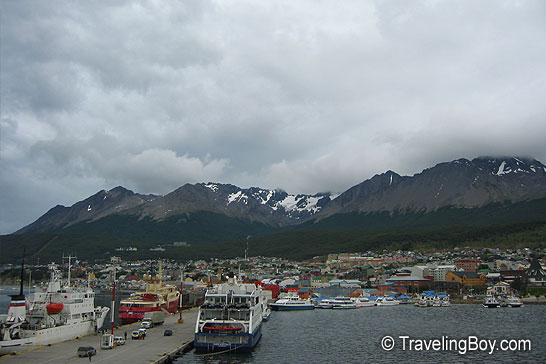
The M/V Discovery departs from Ushuaia,
the world's southernmost city.
Photo Credit: Deb Roskamp |
Landings
The Discovery team leads excursions on zodiac
pontoon motorboats for landings on the Antarctic Peninsula and
her islands. For many on the voyage, setting foot on the continent
was the supreme goal. The weather, though, plays the defining
factor and flexibility is a key word on any voyage. If a certain
passage is clogged by icebergs, the ship's captain, ice master
and expedition team leader will huddle and design another route,
undoubtedly just as rewarding. When one of our landings was cancelled
due to fierce winds, we explored an iceberg alley that featured
mile-long icebergs floating past the vessel. Fortunately, due
to overall favorable weather conditions, we were able to make
two landings, one on Paradise Harbour, considered the Riviera
of Antarctica, and the other on the crescent shaped Half Moon
Island. Both locations offer stunning photo opportunities and
close-up encounters with thousands of gentoo and chinstrap penguins.
It's austral summer and the black sand seems almost warm on your
feet. Parent penguins are feeding their chicks. The scope and
vastness of the surroundings are unimaginable.
Antarctica-a look back
Since my return I am frequently asked what's
it like to journey to this spectacular,
but almost hidden continent. No words adequately describe the
experience. Quite simply, it is the most beautiful place I've
ever seen. There were some days when I stood on the deck of the
vessel and quite literally felt like I was on another planet.
My advice: plan your trip n o w. The season is short and the demand
is great. For further information, contact DiscoveryWorldCruises.com
or (866) 623-2689.
|





![]()



